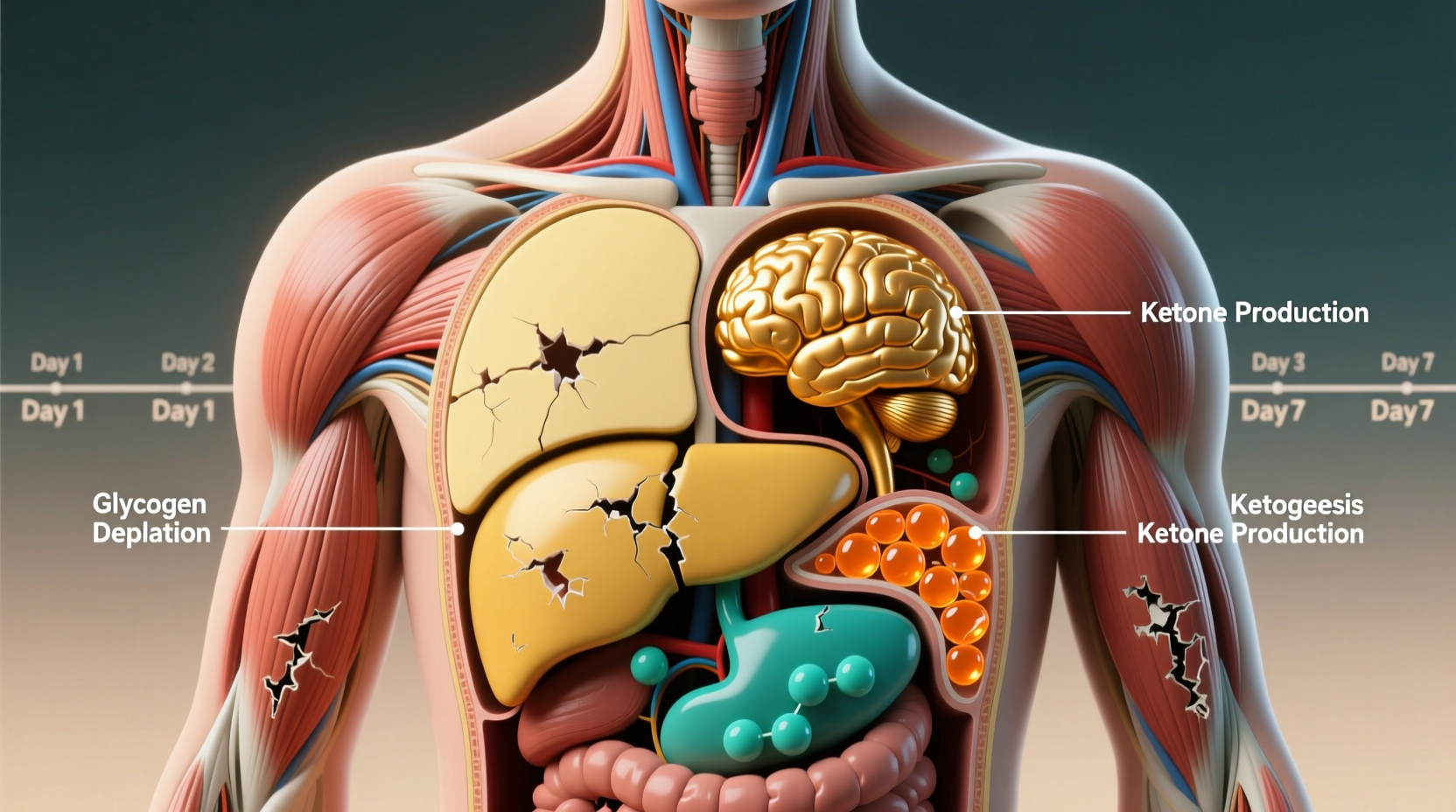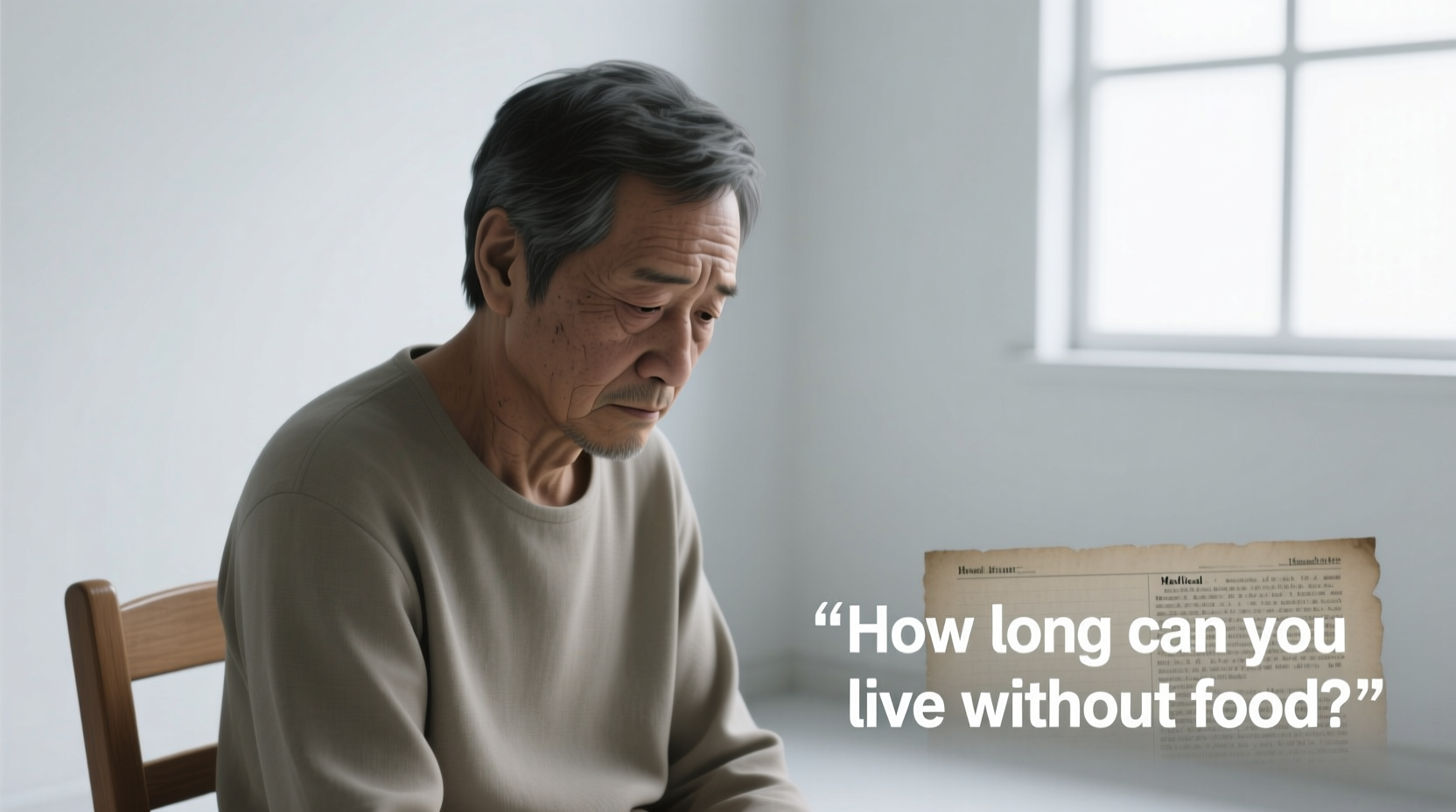The Science Behind Human Starvation: What Happens to Your Body
When you stop eating, your body undergoes a carefully orchestrated metabolic shift to preserve vital functions. Within hours of your last meal, your body begins tapping into stored energy reserves through a process called ketosis. Understanding this physiological timeline helps explain why survival periods vary.

Metabolic Stages of Food Deprivation
Your body doesn't simply "run out" of energy when you stop eating. Instead, it systematically transitions through distinct metabolic phases:
| Time Period | Primary Energy Source | Physiological Changes | Noticeable Symptoms |
|---|---|---|---|
| 0-24 hours | Glycogen stores | Insulin levels drop, glucagon increases | Mild hunger, possible irritability |
| 24-72 hours | Fat stores (ketosis begins) | Liver produces ketones for brain fuel | Increased mental clarity, reduced hunger |
| 3-7 days | Primary ketosis | Metabolism slows by 15-20% | Fatigue, dizziness, possible headaches |
| 7-30+ days | Fat and muscle breakdown | Protein catabolism increases | Severe weakness, organ strain, edema |
Four Critical Factors That Determine Survival Time
While the 30-60 day range applies to average healthy adults, these four factors dramatically influence individual outcomes:
1. Body Composition and Fat Reserves
Individuals with higher body fat percentages generally survive longer. According to research published in the Journal of Clinical Investigation, people with 15-20% body fat may survive 60-70 days, while those with less than 5% body fat might only last 25-30 days under identical conditions. The body prioritizes fat stores before breaking down muscle tissue, making body composition a critical survival factor.
2. Hydration Status
Water is far more critical than food for immediate survival. Without adequate water, survival drops to just 3-7 days regardless of food intake. The Centers for Disease Control and Prevention emphasizes that dehydration accelerates organ failure and significantly reduces starvation survival time. Even with food, without water you cannot survive more than a week.
3. Environmental Conditions
Temperature dramatically affects survival duration. In cool environments (60-70°F), metabolic rate decreases, conserving energy stores. The Nature Scientific Reports documented cases where individuals in cold conditions survived 10-15 days longer than those in hot environments. Physical activity also depletes reserves faster—complete rest can extend survival time by weeks.
4. Pre-Existing Health Conditions
Underlying medical conditions significantly impact starvation tolerance. People with diabetes experience dangerous blood sugar fluctuations within days. Those with heart conditions face increased risk as the heart muscle weakens. Research from the National Institutes of Health shows that individuals with chronic illnesses may survive only 15-25 days even with adequate water.
Starvation vs. Fasting: Critical Distinctions
It's essential to distinguish between voluntary therapeutic fasting and involuntary starvation:
- Controlled Fasting: Medical supervision, planned refeeding, adequate hydration
- Involuntary Starvation: Unplanned, no medical oversight, often accompanied by dehydration
Therapeutic fasting under medical supervision rarely exceeds 14 days due to refeeding syndrome risks. In contrast, historical cases of prolonged survival (like the 1981 Irish hunger strikes where participants survived 46-73 days) occurred with medical monitoring and strategic hydration.
When Starvation Becomes Life-Threatening
Certain symptoms indicate immediate medical danger during prolonged food deprivation:
- Severe dizziness or inability to stand (orthostatic hypotension)
- Chest pain or irregular heartbeat
- Confusion or disorientation
- Severe abdominal swelling (edema)
- Complete inability to consume fluids
These symptoms suggest organ strain that requires immediate medical intervention. The World Health Organization reports that refeeding syndrome—electrolyte imbalances when food is reintroduced—causes 20% of starvation-related deaths, making professional medical supervision crucial during recovery.
Practical Guidance: What to Do If Facing Food Shortage
If you're concerned about food access, these evidence-based strategies can maximize safety:
- Prioritize water purification and conservation above all else
- Maintain complete physical rest to conserve energy
- Stay in cooler environments when possible (below 75°F/24°C)
- Avoid alcohol and caffeine which accelerate dehydration
- Seek medical help if fasting exceeds 7 days or symptoms develop
Remember that intentional prolonged fasting without medical supervision carries significant risks. The American Medical Association strongly advises against fasting beyond 72 hours without professional guidance due to refeeding syndrome dangers.
Frequently Asked Questions
How long can you survive without food but with water?
With adequate water intake, most healthy adults can survive 30-60 days without food. This timeframe varies based on body composition, health status, and environmental conditions. Individuals with higher body fat percentages generally survive longer as the body utilizes fat stores for energy during starvation.
What happens to your body after 3 weeks without food?
After three weeks without food, the body enters advanced starvation mode. Muscle wasting accelerates as the body breaks down protein for energy, metabolic rate drops by 30-40%, organ function declines, and the immune system weakens significantly. Dangerous electrolyte imbalances develop, increasing risk of cardiac arrhythmias and other life-threatening complications.
Can you survive longer without food than without water?
Yes, humans can survive significantly longer without food than without water. While the average person might survive 30-60 days without food (with water), survival without water typically ranges from just 3-7 days. Water is essential for immediate bodily functions, while the body can adapt to utilize stored energy reserves when food is unavailable.
What are the first signs of starvation in the human body?
The earliest signs of starvation include intense hunger (first 24 hours), followed by fatigue, dizziness, and irritability as glycogen stores deplete. By day 3-5, many experience improved mental clarity as ketosis begins, but this transitions to weakness, difficulty concentrating, and reduced body temperature as starvation progresses beyond one week.
Does body fat extend how long you can survive without food?
Yes, body fat significantly extends survival time without food. Each pound of body fat contains approximately 3,500 calories. Individuals with higher body fat percentages (15-25%) may survive 60-70 days, while those with very low body fat (under 5%) might only last 25-30 days. However, adequate hydration remains essential regardless of body fat levels.











 浙公网安备
33010002000092号
浙公网安备
33010002000092号 浙B2-20120091-4
浙B2-20120091-4